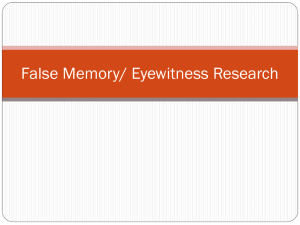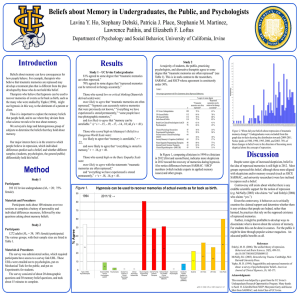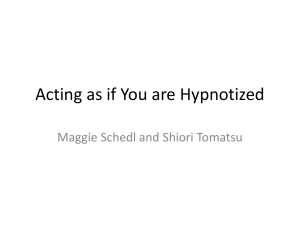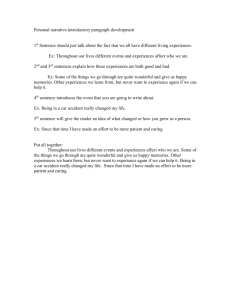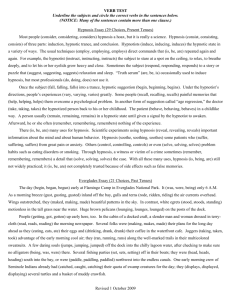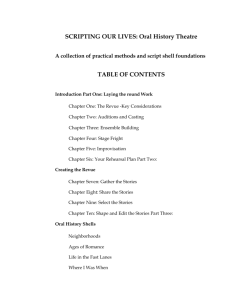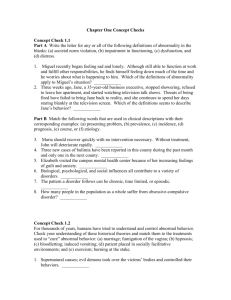The Admissibility of Repressed Memories of Childhood Sexual
advertisement
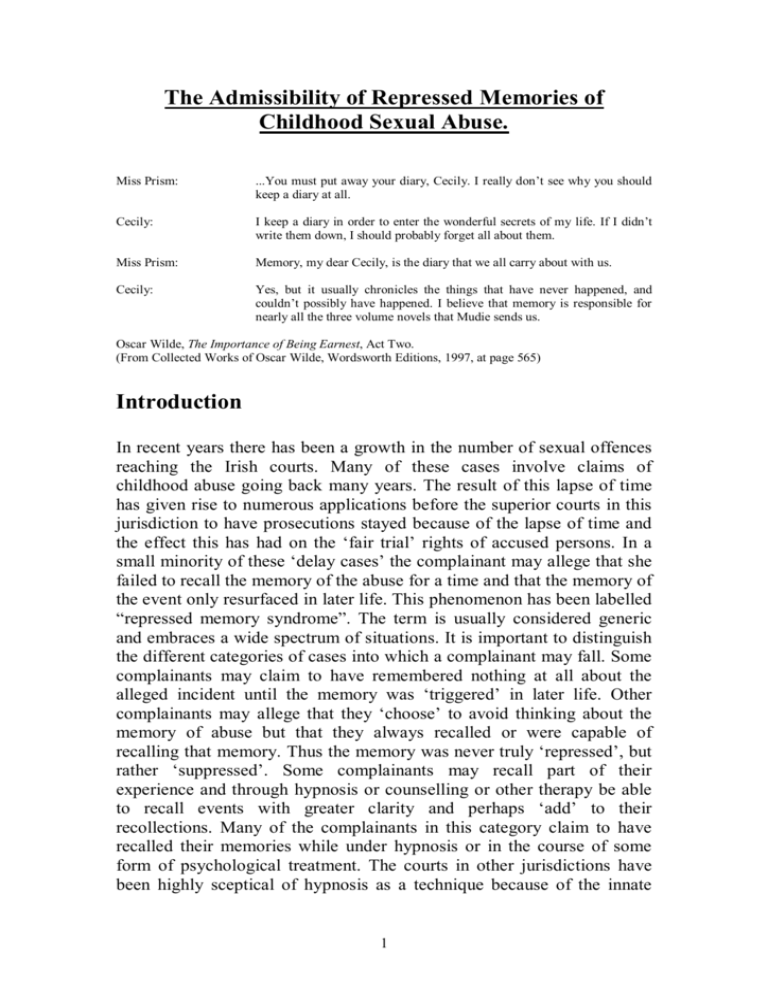
The Admissibility of Repressed Memories of Childhood Sexual Abuse. Miss Prism: ...You must put away your diary, Cecily. I really don’t see why you should keep a diary at all. Cecily: I keep a diary in order to enter the wonderful secrets of my life. If I didn’t write them down, I should probably forget all about them. Miss Prism: Memory, my dear Cecily, is the diary that we all carry about with us. Cecily: Yes, but it usually chronicles the things that have never happened, and couldn’t possibly have happened. I believe that memory is responsible for nearly all the three volume novels that Mudie sends us. Oscar Wilde, The Importance of Being Earnest, Act Two. (From Collected Works of Oscar Wilde, Wordsworth Editions, 1997, at page 565) Introduction In recent years there has been a growth in the number of sexual offences reaching the Irish courts. Many of these cases involve claims of childhood abuse going back many years. The result of this lapse of time has given rise to numerous applications before the superior courts in this jurisdiction to have prosecutions stayed because of the lapse of time and the effect this has had on the ‘fair trial’ rights of accused persons. In a small minority of these ‘delay cases’ the complainant may allege that she failed to recall the memory of the abuse for a time and that the memory of the event only resurfaced in later life. This phenomenon has been labelled “repressed memory syndrome”. The term is usually considered generic and embraces a wide spectrum of situations. It is important to distinguish the different categories of cases into which a complainant may fall. Some complainants may claim to have remembered nothing at all about the alleged incident until the memory was ‘triggered’ in later life. Other complainants may allege that they ‘choose’ to avoid thinking about the memory of abuse but that they always recalled or were capable of recalling that memory. Thus the memory was never truly ‘repressed’, but rather ‘suppressed’. Some complainants may recall part of their experience and through hypnosis or counselling or other therapy be able to recall events with greater clarity and perhaps ‘add’ to their recollections. Many of the complainants in this category claim to have recalled their memories while under hypnosis or in the course of some form of psychological treatment. The courts in other jurisdictions have been highly sceptical of hypnosis as a technique because of the innate 1 capacity for ‘suggestion’. ‘Suggestion’ involves making a person believe they were abused even though they may not in fact have been abused at all. Hypnosis has been condemned as a highly suggestive technique and the courts in the United States and New Zealand have demanded considerable safeguards to ensure that the memories recalled under hypnosis are sufficiently reliable to be presented in the courtroom. As well as hypnosis some psychologists and psychiatrists have also claimed that people may be open to suggestion in other ways e.g. through counselling and therapy. While to date this issue has not been raised before the Irish courts, it is a matter which may give rise to some consideration in the future. These claims that a person may be ‘suggested’ into believing they were abused have given rise to the coining of the phrase ‘false memory syndrome’. This term implies that the memories a person claims to have ‘recovered’ may not be true memories but may have been planted or developed through fantasy, therapy, suggestion or other means. It is now proposed to consider the approach taken by the courts in New Zealand, the United States and Ireland in dealing with this controversial area. One of the reasons why the courts have been sceptical of “repressed memories” is because of the lack of general acceptance among the scientific community that the phenomenon truly exists. The issue is one that is highly controversial and hotly debated among experts in this area. On the other hand the courts have not dismissed the theory outright, which is encouraging, but have consistently demanded adequate proof as to the reliability of memories that have been alleged to have been recalled or enhanced in some way. The Approach in New Zealand In New Zealand the issue of hypnotically refreshed memories has been twice considered by the Court of Appeal. In the case of R. v. McFelin1 the Court of Appeal considered whether hypnotically induced testimony was admissible at trial. This case concerned the effect of hypnosis on the admissibility of the victim’s own testimony. The court was referred to scientific writings and decisions of American courts in this area. The court accepted that there were “formidable dangers” with regard to the use of hypnosis to elicit testimony from a witness. The court identified those dangers as follows: 1 [1985] 2 NZLR 750. 2 “Under hypnosis a person may unconsciously respond to intended and unintended cues. They may be eager to please the hypnotist, or those who have promoted the experiment, by producing answers. The subject’s capacity to judge the reality of his apparent memories may be impaired. Without knowing that he is doing so he may confabulate, recounting what he firmly believes to be a memory although in truth he has only imagined it. He may also acquire a stronger and artificial confidence in prehypnotic memories. Hence the saying that the defence no longer has the same witness to cross examine”2 Having identified the dangers with hypnosis the court then considered the approach of the American courts. The Supreme Court of California in the cases of People of California v. Shirley3 and People of California v. Guerra4 moved from “a position that hypnotism goes to weight but not admissibility to a rule positively excluding hypnotically-induced testimony.”5 The basis of the court’s decisions in these cases rested on the evidence that the use of hypnosis is not generally accepted among the scientific community as a reliable procedure to restore and improve the memory of potential witnesses. However the legislature in California intervened to ameliorate (slightly) the effect of this exclusionary rule with regard to hypnotically induced testimony. Section 795 was inserted into the California Evidence Code and provides as follows: (a) The testimony of a witness is not inadmissible in a criminal proceeding by reason of the fact that the witness has previously undergone hypnosis for the purpose of recalling events which are the subject of the witness’ testimony, if all of the following conditions are met: (1) The testimony is limited to those matters which the witness recalled and related prior to the hypnosis. (2) The substance of the pre-hypnotic memory was preserved in written, audiotape or videotape form prior to the hypnosis. (3) The hypnosis was conducted in accordance with all of the following procedures: 2 [1985] 2 NZLR 750, at p. 752. 31 Cal 3d 18 (1982). 4 37 Cal 3d 385 (1984). 5 [1985] 2 NZLR 750, at p. 752. 3 3 (A) A written record was made prior to hypnosis documenting the subject’s description of the event, and information, which was provided to the hypnotist concerning the subject matter of the hypnosis. (B) The subject gave informed consent to the hypnosis. (C) The hypnosis session, including the pre and post-hypnosis interviews, was videotape recorded for subsequent review. (D) The hypnosis was performed by a licensed medical doctor or psychologist experienced in the use of hypnosis and independent of and not in the presence of law enforcement, the prosecution, or the defence. (4) Prior to admission of the testimony, the Court holds a hearing pursuant to Section 402 of the Evidence Code at which the proponent of the evidence proves by clear and convincing evidence that the hypnosis did not so affect the witness as to render the witness’ pre-hypnosis recollection unreliable or to substantially impair the ability to cross examine the witness concerning the witness’ pre-hypnosis recollection. At the hearing each side shall have the right to present expert testimony and to cross examine witnesses. (b) Nothing in this section shall be construed to limit the ability of a party to attack the credibility of a witness who has undergone hypnosis, or to limit other legal grounds to admit or exclude the testimony of that witness. Under this Rule any new information coming to light after the hypnosis is still inadmissible. The Rule only serves to permit testimony from a witness who has recalled events prior to hypnosis and only if the hypnosis has been conducted under the conditions listed. This rule still maintains the exclusionary thrust of the Supreme Court’s decisions in this area and only allows admissibility in very narrow circumstances. The approach of Cooke J. in the New Zealand case of McFelin was more liberal than the approach of the Californian authorities. The Court accepted that “if testimony has literally been hypnotically induced there will obviously be in some cases strong reason for excluding it”6. The court referred to the Guerra case as a good example of that, where the complainant prior to hypnosis had spoken only of attempted rape and after undergoing hypnosis produced a memory of actual penetration. The Court was “not prepared to lay down for New Zealand an inflexible rule of inadmissibility”. The court was of the opinion that “hypnotically 6 [1985] 2 NZLR 750, at p. 752. 4 induced testimony might safely be admitted in some cases”, especially where a “detail” elicited by hypnosis might be “later verified or corroborated by independent evidence”.7 The court did however invite the relevant authorities in New Zealand to propose guidelines with the consensus of the relevant scientific and medical bodies with regard to the conduct of hypnosis sessions with potential witnesses. In the absence of such a development the court said that the police and trial judges could look at the guidelines offered overseas which indicate the “kind of precautions which should at least be considered”8. Although a failure to videotape the hypnosis session or to comply with overseas guidelines would not mean that the evidence should be automatically be excluded. The matter is for the discretion of the trial judge “to be exercised in the light of the factors discussed in the present judgment”9. The court concluded that “the greater the safeguards, the greater the likelihood that the evidence will be admitted”10. The court laid down the following preliminary guidelines that should be followed: “1. The fact that the witness was hypnotised should be disclosed to the defence, and all relevant transcripts and information provided on request. 2. If objected to, the evidence should be excluded unless the Judge is satisfied that it is safe to admit it in the particular circumstances. 3. The Judge should have regard to whether the hypnotism was carried out by a qualified person independent of the police and the prosecution, and sufficient safeguards against the influencing of the subject by suggestions or otherwise. 4. Pending the establishment of New Zealand guidelines, in deciding whether safeguards are sufficient, reference may be made to overseas guidelines, such as the Californian section set out in this judgment. They are not mandatory in New Zealand but indicate standards to be aimed at as far as reasonably possible. 5. The Judge should also have regard to the strength of any confirmatory or supporting evidence to be called by the Crown. This applied in all cases but is especially important in relation to any recollection or 7 [1985] 2 NZLR 750, at pp. 752-753. [1985] 2 NZLR 750, at p. 754. 9 [1985] 2 NZLR 750, at p. 754. 10 [1985] 2 NZLR 750, at p. 754. 8 5 purported recollection which is not proved by the Crown to have existed before hypnotism. 6. If he admits the evidence, the Judge should warn the jury of the special need for caution before relying on post-hypnotic evidence. The warning need not be in any particular terms but should adequately alert the jury to the dangers referred to in this judgment.”11 The judgment of the Court of Appeal in McFelin was reaffirmed ten years later by the High Court of New Zealand in the case of R. v. G.12 and extended to cases where the subject recalls memories after undergoing hypnosis. In that case Tompkins J. giving the judgment of the High Court held that although the facts of McFelin’s case did not concern post hypnotic recollection, nevertheless the principles enunciated in that case “should also be applied where the witness, having undergone hypnosis, later recalls factual matters he or she had not recalled before”13. The court in this case also found it helpful to refer to American authorities in this area. The court referred to the case of State of New Hampshire v. Hungerford and Morahan14. In that case the accused was charged with sexual assault. The victim had no memory of the assault for several years and the memories were recovered through a process of psychotherapy. The court held that the evidence of the complainant should be excluded. In that case the court referred to the American Medical Association’s report of the Council of Scientific Affairs which considered “recovered memories of childhood sexual abuse to be of uncertain authenticity which should be subject to external verification”. It was the held by the Court of Appeal that the reliability of the phenomenon of “repressed memory” has not been established and the phenomenon of “false memories” cannot be dismissed. On that basis the court concluded that; “the testimony of the victims as to their memory of the assaults shall not be admitted at trial because the phenomenon of memory repression, and the process of therapy used in these cases to recover the memories, have not gained general acceptance in the field of psychology; and are not scientifically reliable.”15 The court in that case reiterated the advantage a set of agreed guidelines on this matter would have: 11 [1985] 2 NZLR 750, at pp. 754-755 [1996] 1 NZLR 615. 13 [1996] 1 NZLR 615, at p. 620. 14 (1995) 142 N.H. 110. 15 [1996] 1 NZLR 615, at p. 621. 12 6 “An agreed set of guidelines, approved by the Courts, would be of considerable benefit, not only to Judges charged with deciding issues such as those in the present case, but also to police, prosecutors and defence counsel in any case where there is evidence resulting from recovered memory, however it may have been induced”.16 However in the absence of these guidelines being agreed between the Ministry for Justice in collaboration with the scientific/medical community the guidelines set out by Cooke J. in McFelin are likely to become more established in this area. The position in New Zealand is that evidence of “repressed memories” are not automatically excluded from the court room. However the courts are aware of the disagreement among the experts in the fields of psychology and psychiatry as to the existence of the phenomenon of “repressed memories”. The courts in New Zealand demand a good measure of safeguards to be employed, particularly where a witness has undergone hypnosis, to avoid the danger of relying on false or inaccurate memories of past events. The courts have not demanded that such memories be corroborated, although corroboration will strengthen the weight to be attached to those memories. The issue of corroboration has already been canvassed in this context in the Irish Courts but has not been ruled on definitively. This will be discussed below. Repressed Memory in Ireland In the case of P.C. v. D.P.P.17 Denham J. in the course of her judgment acknowledged that “that rational consideration of abusive events is frequently suppressed for complex personal, family and social reasons”. In this case the complainant had been sexually abused by her father and fact that the complainant “repressed” or “suppressed” the memories of that abuse accounted for the delay in her complaining to the gardai. The matter was taken up by Hardiman J. in the case of J.L v D.P.P.18. In that case Hardiman J. considered the controversy surrounding “repressed memories” of child sexual abuse. In that case Hardiman J. referred to the 16 [1996] 1 NZLR 615, at p. 623. [1999] 2 I.R. 25 18 [2000] 3 I.R. 122. See in particular the judgment of Hardiman J. at pp. 145 et seq.. 17 7 judgment of Denham J. in the case of P.C. v. D.P.P.19 Hardiman J. in his judgment considered that, from previous authorities, considerations of repression are confined to cases of dominance, particularly where “the parties are closely related or associated, live in the same house or institution or are otherwise inextricably connected, over a long period of time”20. He concurred with the observation of Denham J. in P.O’C. that “there is a growing understanding of the whole issue of child sexual abuse – an unfolding knowledge” and that “the legal system should benefit from the increased knowledge”. However Hardiman J. cautioned that for the court to benefit from new insights in the area of child sexual abuse it is important that such insights should be “fully understood and generally accepted, and established by proper evidence in the particular case”21. Hardiman J referred to an article written by Lewis and Mullis entitled “Delayed criminal prosecutions in childhood sexual abuse: ensuring a fair trial”22 where the authors note that the issue of “repressed memories” is “hotly controversial” and one which has divided professional bodies such as the American Psychiatric Association, the Royal College of Psychiatrists, and the British Psychological Society. Hardiman J. noted that in that article the authors refer to the report of a working party set up by the Royal College of Psychiatrists to investigate the issue of “repressed memories”. The report concluded that • There is no empirical evidence to support the concept of repression although there is much clinical support for the concept. • There is no evidence to support the existence of “robust repression”. • Events are constantly forgotten and remembered on a daily basis. • There is abundant evidence, both clinically and experimentally, that memory can be distorted and that false memories do occur. • Illusory memories can arise during the course of therapy whether or not it is designated as recovered memory therapy. The creation of such illusory memories seems to depend on the conviction of the 19 [1999] 2 I.R. 25 [2000] 3 I.R. 122, at p. 146. 21 [2000] 3 I.R. 122, at p. 147. 22 (1999) 115 L.Q.R. 265. 20 8 therapist or the patient that childhood abuse underlies adult psychopathology. Hardiman J. continued to warn that there exists the very real possibility of miscarriages of justice where prosecutions are based on recovered memories that are said to have been previously repressed. Hardiman J. called for “impartial presentation of psychiatric or psychological evidence”23 to avoid such miscarriages of justice. In J.L. Hardiman J. referred to the affidavit of Ms McElvaney in that case and noted that while the term “repressed memory” was not used it was clear that this was what Ms. McElvaney was referring to when she said that the complainant had “blocked out” the abuse and that her experience was only subsequently “triggered” by the Fr. Brendan Smyth case. However details of the complainant’s earlier experiences with counselling and therapy were not forthcoming. This was fatal to a proper analysis of the issue in that case. The names of the counsellors were not revealed, their qualifications were not disclosed, and the “potential role [of counselling] in relation to disclosure” was not discussed. These omissions meant that it was difficult to determine into which category this case fell; whether it was the case that the abuse was always remembered but with a psychological difficulty in revealing it, or whether it was a case where the memory was repressed and subsequently recovered, or partly both. Hardiman J. considered that “This distinction is a significant one. If the alleged memory is wholly or partly a repressed one recovered, wholly or partly, as a result of therapy, that fact is immensely relevant both on the question of lapse of time and on the question of the inherent reliability of the evidence. If the memory is viewed wholly or partly as a repressed one its validity as a factor excusing delay depends on the view taken of the reality of repression as a phenomenon.”24 Hardiman J. considered that if it is claimed that the memory was repressed and that this is a factor excusing delay then it may be necessary, as in the U.S., to determine whether this claim is reliable. Although the learned judge did not elaborate on what this “reliability determination” would involve presumably it would entail a consideration of the scientific evidence surrounding the concept of repression. 23 24 [2000] 3 I.R. 122, at p. 149 [2000] 3 I.R. 122, at page 151 9 Where a memory was alleged to have been recovered through therapy, Hardiman J. referred to the case of New Hampshire v Hungerford25, and considered that an enquiry should be conducted which would include: “an examination of the therapist’s qualifications, the type of therapeutic approach used, whether complaints of false accusations had been filed against the therapist, whether the therapist ordinarily seeks hidden memories or believes that many psychological problems stem from sexual abuse, and whether the therapist remains detached during the process or validates allegations of abuse that arise”. False Memories of Abuse and Hypnosis The Irish courts have maintained the traditional skepticism towards hypnotically refreshed memories adopted in the U.S. and New Zealand. In the case of N.C. v. D.P.P. Hardiman J. considered the effect hypnosis has on the fairness of the proceedings in question. In that case the applicant was accused of indecent assault against two of his sisters M. and K. between 1961 and 1974. The case was described as “unusual” by Hardiman J. because of the fact that one of the complainants K. claimed to have forgotten the alleged assaults until they were recalled during hypnosis. However the details of the hypnosis were not forthcoming. In particular the time and place of the hypnosis, and the identity of the hypnotist, had been lost due to lapse of time. K. did not immediately report the abuse once having recalled it through hypnosis but when she did it appears to have triggered the recollections of her sister M. In that case the mother of the applicant and the complainants was said to have been sceptical of the allegations made and it was she who took K. to see the hypnotist. However the mother died in 1989. Hardiman J considered that this was a case of “recovered memory”, i.e. “a memory which has been lost due to repression and subsequently recovered, often in the course of some form of therapy”. Hardiman J referred to his judgment in J.L. (discussed above) and again warned of the danger of “illusory memories”. In this case K. was examined by a psychologist on behalf of the D.P.P. Cross-examination of the psychologist revealed that K. originally recalled being abused at the age of 14, however in the words of the psychologist she “realised that she could not have been or was not and that she was 25 (1995) 142 N.H. 110. 10 only abused as a little girl of 4 to 8”. The psychologist noted that “there was some distortion” in her memory of events. The time difference was highly significant in this case. If the abuse was alleged to have occurred at a time when K. was 14 years old then it could be shown that the applicant had moved out of the family home at that stage, and this would have rendered the account of the complainant highly improbable. While if the alleged abuse occurred while K. was between 4 to 8 years old the applicant was still residing in the family home and the complainant’s account would have been rendered more probable. There was no explanation put forward as to how K. realised that she might have been abused at a much younger age than she originally supposed. This was especially worrying because for six years K. believed she was abused at 14. Hardiman J. considered the effect the hypnosis had on the fairness of the trial. He concluded that the situation was “fraught with risk of unfairness” because the hypnotist was unavailable for examination. The hypnotist was considered to be “an extremely important witness” especially so in this case where “the memory is admitted to have been, in very important particulars, false or distorted”. He referred again to his judgment in J.L. and said that “ a person charged with very old offences on the basis of alleged recovered memory is both well advised, and entitled, to seek to inform himself about every aspect of the therapy. If this cannot be done then there is no effective test or control of the mechanism of alleged recovered memory”. From these two judgments of Hardiman J. it would seem that the courts in Ireland are likely to be highly sceptical of repressed memory claims. On the other hand the courts have expressed an eagerness to engage with the scientific community on this issue. The courts have not dismissed the issue outright but are insistent on a full presentation of the surrounding circumstances giving rise to the recall of the allegedly repressed memory. The courts in Ireland are likely to demand a highly detailed presentation of the therapy a complainant may have undergone. It is possible that the Irish courts may adopt the guidelines proposed by the New Zealand Court of Appeal where claims are based on hypnotically refreshed memories. Repressed Memories on Trial The only case where it was claimed the defendant was convicted on the basis of restored memories is the case of People (D.P.P.) v. Vincent 11 McKenna26. On appeal against conviction it was argued by the appellant that at his trial the trial judge should have given the jury a warning along the lines of the identification warning mandated by the case of People (D.P.P.) v. O Casey (No.2). The reasoning behind this argument was that because the complainant had undergone counselling and therapy her memories of the abuse were “effectively restored”. The Court of Criminal Appeal dismissed the suggestion that the complainant’s memories were “restored”. It was “abundantly clear” that this was not a case where the complainant was unable to recall the abuse prior to her receiving counselling organised by the health board. The court held that: “The complainant never wavered in her evidence from her basic assertion that at all material times she knew she had been abused by her father but that in order to put details together for the purpose of a court case she did find it helpful to have the counselling and she did use a kind of visual memory process to work out the details. In the event she was able to give evidence of precise particular incidents of sexual abuse”.27 At the trial of the applicant the court had the advantage of the notes of the counselling sessions between the complainant and her counsellor. The trial judge had ruled that there was no privilege in these documents as claimed by the health board. There is no doubt that the availability of these notes was essential to the court’s finding that this was not a “recovered memory” case. The court considered whether if it was a “recovered memory” case the accused would have been entitled to call expert witnesses on that controversial issue? The court held that it would not to appropriate to comment on these “hypothetical” matters. However the court did say that if this were a ‘recovered memory’ case there might be a good argument in favour of giving a warning to the jury about convicting on the basis of “recovered memories” of abuse. Again the court pointed out that such a warning was not necessary in this case and left it for another day to decide for definite whether a warning should be given in other cases.28 The McKenna case is a significant contrast to the cases of J.L. and N.C. discussed above. In McKenna the court had available to it the notes and other documentary evidence from the counselling sessions between the complainant and her therapist. This allowed the court to monitor the counselling and to determine the effect it may have had on the reliability 26 Unreported, 19th October, 2001, Court of Criminal Appeal, , Geoghegan J. (Carroll J. and O Neill J. concurring). Available at www.firstlaw.ie. 27 Ibid. at p. 6. 28 Ibid at p. 15 of the judgment. 12 of the complainant’s testimony. From that evidence it was clear that the complainant had always remembered the events of the abuse but that the counselling sessions allowed her to recall these events more clearly and to overcome her natural inclination to suppress those memories because of the trauma associated with them. In this case the fact that this case could be distinguished from a case where the complainant at some point failed to recall the abuse at all and only recovered the memories of the abuse through therapy was also helpful in ensuring the court did not dismiss the evidence of the complainant. Where the complainant is in a situation that she failed to recall the memory of the abuse and only recovered those memories in later life it may be more difficult to convince the court as to the reliability of such a complainant’s testimony. In that scenario if the evidence of the complainant is admitted at all it may well be that the court may want to warn the jury about the dangers in convicting on the evidence of those “recovered memories”. In such a situation it is submitted that the jury should be told exactly why the courts think that such testimony should be approached with caution i.e. because of the danger of suggestibility etc. Conclusion The issue of “repressed memory” is only beginning to be discussed in the Irish Courts. It is the writer’s opinion that the issue will be considered again very soon in the future as society becomes more and more aware of the problem of childhood sexual abuse and as the protagonists in that society become more open to listening to the complaints of that abuse. However in our eagerness to listen we should also maintain a healthy degree of realism and approach each complaint with a degree of common sense. Where the details surrounding recovered memories are obscure and not forthcoming it would be dangerous to rely on such testimony to convict a person of a very serious crime. On the other hand the courts in Ireland need to be aware of the significant distinctions that can be made between complainants in this context. A complainant who party recalls the events should not be treated in the same way as a complainant who only remembers the abuse after she underwent some form of therapy. The courts will also need to keep up to date with the developments in scientific and expert knowledge in this area. The full and impartial presentation of expert evidence in this context will be crucial to ensuring that the courts make the best decisions affecting the admissibility of repressed memories. Encouragingly the Irish courts have shown an eagerness to consider the ‘pros and cons’ put forward by the scientific community for the existence and reliability of “repressed memories” and 13 to respond to those insights accordingly. This understanding between law and science should make for an interesting and informed debate in the future as the Irish courts consider the admissibility of repressed memories in cases of childhood sexual abuse. © Gerard Murphy 2002. 14
